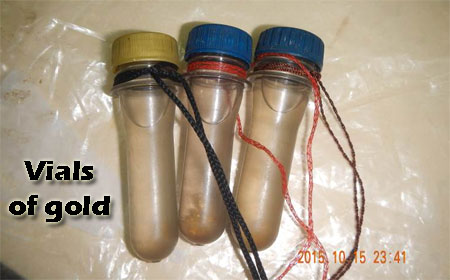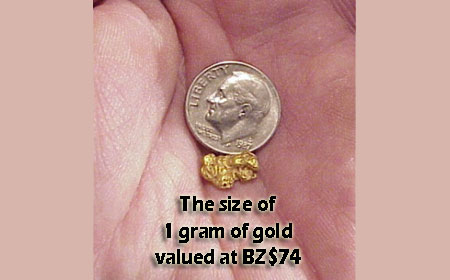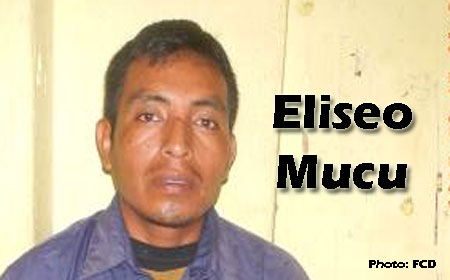BELIZE CITY, Thurs. Oct. 22, 2015–Expensive gold nuggets continue to be pillaged from Belize’s Chiquibul Forest—evidently by Guatemalans who knowingly make illegal incursions across the border into Belizean territory. Friends for Conservation and Development (FCD), the conservation NGO which co-manages the Chiquibul National Park, notes that patrols from the Joint Forces Unit, which includes military and police, have seldom been successful in capturing gold panners.
Recently, though, one Guatemalan, Eliseo Che Mucu, 35, of Monte Los Olivos, Dolores, Petén, was captured—while two of his accomplices escaped.
Mucu—who was detained last Thursday, October 15, approximately 7 kilometers, or more than 4 miles, inside Belize in the Chiquibul National Park—was taken to court after he was found illegally panning for gold in the southern section of the park, according to FCD Executive Director, Rafael Manzanero.
Mucu’s camp, which was located near the river but hidden in the forest, was searched and 3 vials containing what is believed to be gold were found. Each of the three vials is capable of holding several hundred dollars’ worth of gold. (See the illustration which shows the size of a one-gram gold nugget.)
“The rush for gold by Guatemalan locals, [Mucu] says, has occurred due to the people learning from others about the gold deposits in Belize while drinking in bars and on the streets of the big towns. He claims selling the gold at 150 quetzales (approximately BZD$74) per gram in Poptun [Guatemala],” FCD reports.

Mucu informed the Belize patrol that he had been panning for gold inside Belize along with his brother, Pedro Mucu, and another person, both of whom escaped.
“He further explained that gold panners come from many areas of Poptun and Dolores and are mostly ladinos,” FCD reports.
It is uncertain how much gold Mucu and his associates actually took from the area, and how much gold they have pillaged since they began illegally exploiting the area—since Mucu is no stranger to the law in Belize, as he himself confessed.
“They knew they were operating inside Belize and [Mucu] also confirmed that it was the second time he had been arrested by the Belizean authorities in the Ceibo Chico area while illegally [panning for] gold …” FCD says.
We asked Manzanero how repeat offenders are handled, and he told us that it really depends on the Magistrate presiding over the case. Fines should be higher for repeat offenders, he added.
Mucu was charged today in the San Ignacio Magistrate Court for illegal entry and defacing a natural feature in a National Park. He was remanded to prison.
Our newspaper was advised that Mucu was not charged for the illegal extraction of the gold because that falls within the ambit of Mining officials, and they were reportedly unable to make it to the San Ignacio Police Station before the charges were laid. However, that charge can still be levied later.
Whereas arrests of these elusive gold panners are rare, the problem of illegal gold panning has persisted for years, and while the economic impact is evidently monumental, their activities also threaten the health of Belize’s riverine water system, upon which the nation relies for generating potable water for much of the country.
FCD notes that, “Gold panning continues to occur in the remote mountains of the Chiquibul National Park at the hands of Guatemalan ladinos (Spanish) and indigenous people. Encountering them and effectively detaining Guatemalans is difficult due to the terrain and tactical method they use to evade authorities.”
Manzanero notes that FCD’s study earlier this year shows that the impacts of illegal gold panning are already starting to be felt at the headwaters of the Chiquibul watersheds, where erosion, garbage and fecal deposits are known to occur because of the significant amount of Guatemalans operating in the area.
“[A] preliminary study shows [a] concentration of pollutant resistant microbes demonstrating that the area is already being contaminated,” said FCD.
What does this mean from a health standpoint? In response to that question, Manzanero told us, “At this time, [it is] hard to tell, because we just have done the first assessment to establish a baseline. It usually would take several studies.”
He then pointed us to a report, which he provided to us, captioned, “Macroinvertebrate Communities
In Streams of the Chiquibul Forest.” The report points to pollution problems in the Southern Chiquibul River sub-basin, the same area where Mucu was detained.
“The indication of high abundance of pollution tolerant species may start to shed some light into the
notion that illegal gold mining is impacting the water quality of this system; a trend that can only be detected if a systematic macroinvertebrate monitoring system is set in place,” the FCD report reported.
It added that, “Illegal gold panning has been adding unknown amounts of pollutants and sediments to the water column…,” pointing to the high occurrence of germs found in human feces—coliform and Escherichia coli, “…since these individuals that can range [to] over a hundred in the area have no sanitary facilities.”
The FCD recommends measures to control illegal gold panning on the headwaters through coordinated reinforcements, thereby preventing further impacts on the Greater Belize Watershed.

